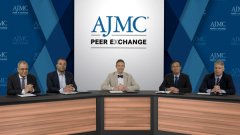
Navigating Adverse Events Associated With HCC Treatment
Dr Abou-Alfa discusses strategies to mitigate the impact of adverse events in patients receiving treatment for HCC.
Episodes in this series

The panel of specialists discusses the significance of adherence to therapy despite potential adverse events and emphasizes the importance of understanding patients' perspectives for successful treatment outcomes.
The discussion begins with an acknowledgment of the effectiveness of existing therapies and mechanisms of action, especially pertaining to checkpoint inhibitors. The experts highlight the challenges associated with maintaining patients on therapy during adverse events. A pharmacist on the panel emphasizes the need for effective communication with patients to prepare them for potential side effects, suggesting strategies such as dose reduction or breaks to prevent premature therapy discontinuation.
The conversation moves to the exploration of multiple clinical studies that demonstrate positive outcomes in HCC patients. The experts elaborate on the critical role of understanding patient profiles and emphasize the significance of factors such as the presence of liver cirrhosis and underlying conditions in determining treatment effectiveness. They stress the importance of ensuring that all eligible patients receive the necessary therapy, considering the impact on survival rates.
The discussion then shifts towards the potential adverse effects of the therapies. The panel stresses the need to educate patients about potential immune-related side effects, ranging from subtle symptoms like joint pain and rashes to more severe complications such as thyroid dysfunction and altered blood sugar levels. The specialists underscore the significance of close monitoring and caution against the risks associated with specific drugs, particularly highlighting the risk of bleeding with bevacizumab, emphasizing the need for careful patient assessment before administering this treatment.
The experts underline the importance of personalized care and the need for comprehensive understanding of the implications of therapy on different organs. They discuss the potential side effects related to specific drugs and the measures necessary to mitigate these effects for improved patient outcomes. The panel also highlights the positive correlation between some immune-mediated adverse events and improved patient responses, underscoring the potential benefits of certain mild adverse effects on overall treatment effectiveness and patient survival rates.
The conversation concludes with an emphasis on the importance of the immune system's role in treatment response and the need for continued research and therapeutic advancements in the field of HCC management. The experts highlight the significance of balancing therapy-induced side effects with the potential benefits, stressing the necessity for effective intervention strategies to control adverse effects and ensure patients' well-being throughout the course of treatment.
Overall, the transcript presents a comprehensive overview of the complexities involved in managing HCC, emphasizing the importance of a patient-centric approach, continuous monitoring, and the need for personalized care to achieve successful treatment outcomes. The experts' insights underscore the critical role of understanding the intricate interplay between therapeutic interventions, patient profiles, and potential adverse effects in ensuring the efficacy of HCC treatment strategies.
Video synopsis is AI-generated and reviewed by AJMC editorial staff.
Newsletter
Stay ahead of policy, cost, and value—subscribe to AJMC for expert insights at the intersection of clinical care and health economics.





